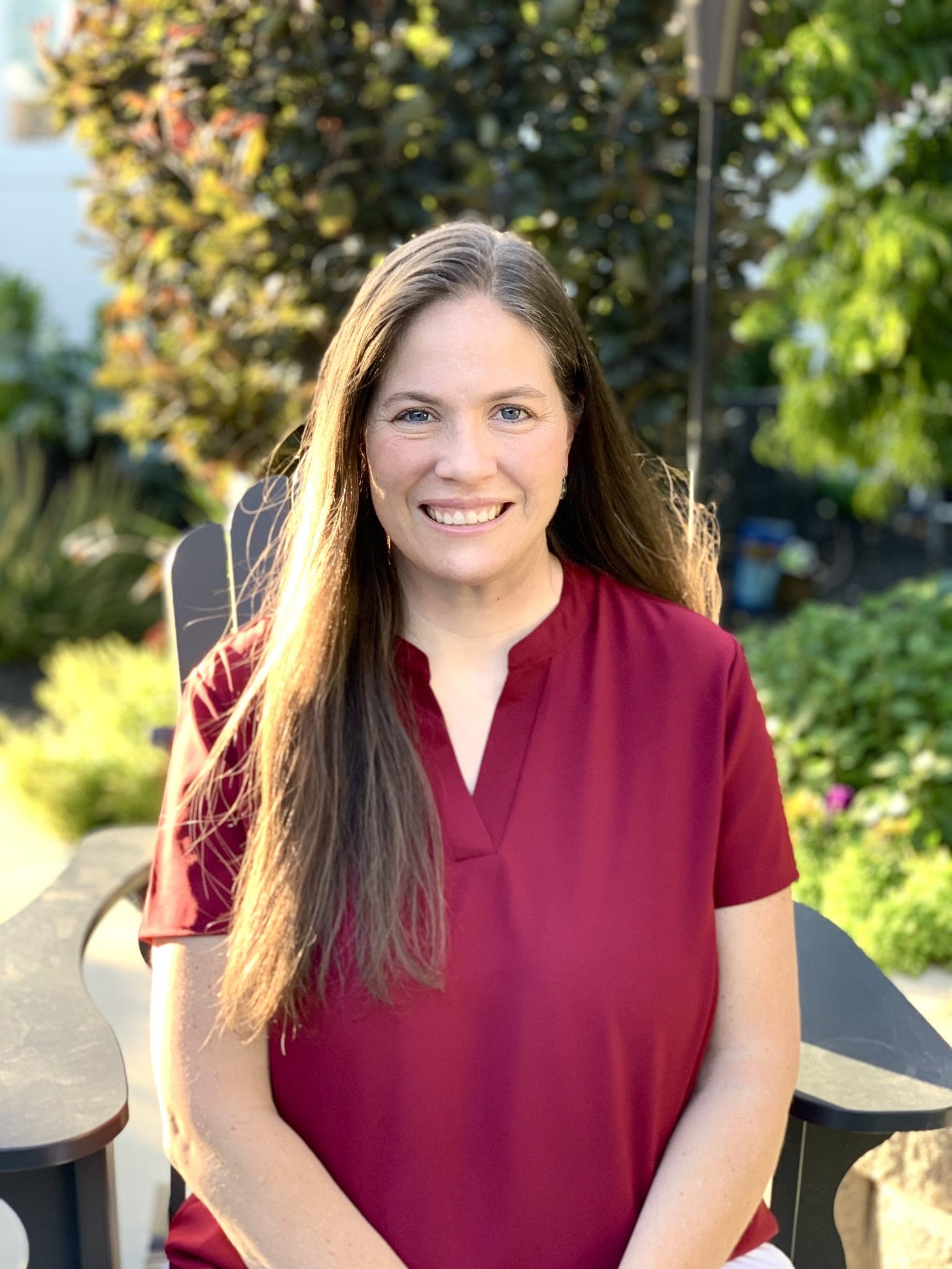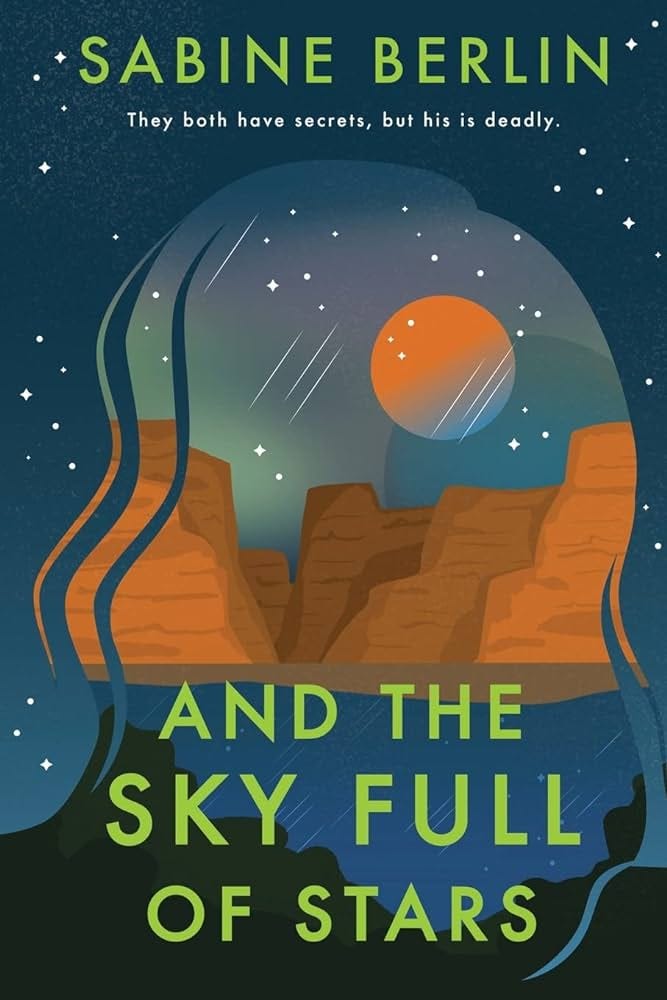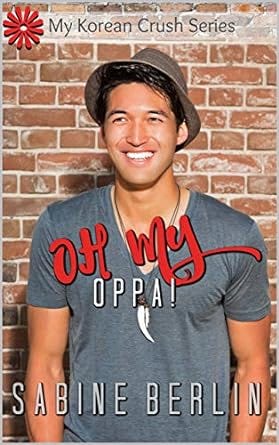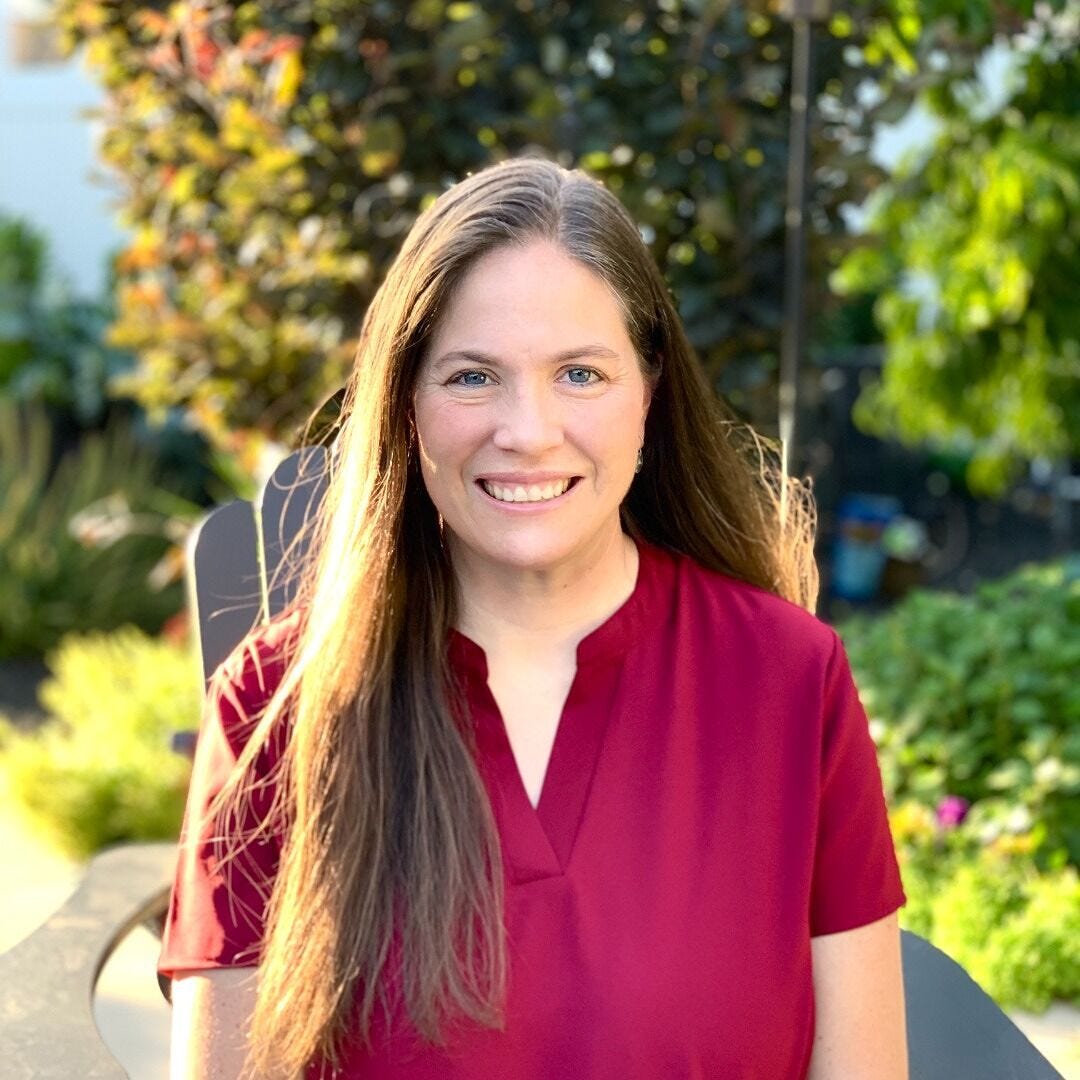This week, I had the chance to sit down with author Sabine Berlin to talk about writing, sci-fi and her recent novel And A Sky Full of Stars.
Sabine Berlin spends her days working in higher education and her evenings imagining what the world would be like if aliens, alternate realities, and all things science fiction were real. She has degrees in higher education leadership, history, and editing and document design. She loves to learn, travel, and watch K-dramas. Most of all she loves spending time with her amazing husband, three awesome kids, and the world’s best chocolate Lab. She lives in Provo, UT.
So, my first question for you, Sabine, is how do you feel about a Star Wars character being named for you?
Pretty cool. I have not seen her yet, but I have a question cause it's her name, Sabine, or is it Sabina? Because my name is pronounced Sabina. I’ve got the German pronunciation.
Wow. I’ve been saying it wrong this whole time.
You know what? Everyone does. Even at work, it’s funny. I usually don’t mind but it’s cool. I’ve seen my name a couple of times in things. The first time I saw it that I thought was really cool was in the Leven Thumps books. The bad guy’s name is actually Sabine. I had the book signed for my son and the author wrote, “Luke, always listen to Sabine.”
Ok. So my actual first question is . . . How did you get into writing? Did you always know you’d be a writer? Or is this something you happened onto?
So I've actually always been a reader. In third grade, I discovered The Dark Is Rising books. That was kind of it for me. That was kind of it for me. I just could not stop reading from that moment on, and everything. I read everything. If it was in the house, I read it. I grew up with two much older sisters so I read a lot of romance books when I was probably too young to be reading them.
Then that went to my older sister getting into [Robert A.] Heinlein and [Isaac] Asimov and so I switched over to a lot of science fiction. In high school. I would write short stories for my friends where they would be the main characters.
What really got me into writing was, I wanted to meet Orson Scott Card. He was coming and doing a literary boot camp, and one of my friends said “We should go to this.” I’m like, “Oh, yeah, I'm all over that. I'm going to this, and I'll pay $200 to learn to be a writer, because I’m good with that.” Then, she told me, “If you write a short story and he accepts it. Then you can spend an entire week with him at a at a boot camp.” I was like, “Okay.” And so I wrote a short story. It was called the LaVerkin Project. It was what would happen if LaVerkin, Utah had gotten a nuclear weapon. I got accepted into his camp and that’s where I learned about writing, and that's where I learned to be an editor as well. From that moment on, I found I loved to write and loved to tell stories.
It’s amazing how writing spins off into editing too. Because you look at things and you automatically see that it isn’t right. I read what was Lindsay Flanagan’s second book after interviewing her and now that book has turned into something completely different.
It is amazing how as writers, we just kind of naturally dovetail into editing. So was editing something you stumbled onto as well?
Kind of. So I went to Orson Scott Card’s camp - - his week-long literary boot camp - - with twelve other writers. It was amazing and I learned so much. I discovered that [editing] was something that I have a knack for. It was kind of a lot funner, to me, to help other people fix their stories than trying to write a story of my own.
So my own writing has actually grown. I have been an editor since 2012 and I’ve only been an author for about a year or longer. My writing kind of evolved from that because I learned so much from helping other people write. Then one day I felt like I had a story inside of me.
It is truly amazing how that works. So who would you say are your writing inspirations for your work?
Surprisingly enough, TV shows - - Farscape, Babylon 5. A lot of science fiction plays into my work because I love to watch science fiction TV shows.
Card is probably a big influence just because he was such a mentor to me during that time. He helped me learn to edit and to learn writing skills.
I love Dean Koontz and I know my stuff isn’t horror. But I love the way he uses metaphors and and language like that. Also, his dialogue. I try to emulate his dialogue because he can write pages of dialogues without any tags, and you know exactly who's talking because he does it that well. Those are the kinds of authors I aspire to be like.
You’ve always been into science fiction, right?
Yeah, for a long time. I was probably in high school when I picked up Card for the first time. Before that, I’d read a lot of Heinlein. I had read the Stainless Steel Rat series. I’d read a lot of [Isaac] Asimov, [Ray] Bradbury. Something Wicked This Way Comes was one of my earlier favorite kind of fantasy. Weird but not contemporary.
So you say a lot of your stuff is inspired by older sci-fi TV shows - - which I would call the golden age of Sci-Fi TV. How would you go about incorporating those things into your books?
I think I'm influenced a lot by different things. For one thing, I really like the idea of Firefly. Specifically, the fact they’re all just human. I took that from Farscape too. This idea that they were other people who looked like us. Now I know Farscape has all kinds but I like this idea that we’re all in this together.
I took the idea of Aeryn Sun’s race from Farscape - - the Sebaceans. Then I started thinking of how humans look. For example, we have people in the Andes Mountains that have broader chests. They don’t look exactly like us because they've adapted to their environment to be able to breathe up in those higher altitudes and and different things. So I thought I would like all alien races to look the same however to have these differences if they've adapted because they live on a water world, or they've adapted to their environments in some way.
So that was kind of something I took from that. Obviously I took ideas and tweaked him. Sometimes subconsciously. You found one and said “You did this, didn’t you?” I was like “I didn’t mean to do that. I meant to do this!”
It was funny to me because Trilla (the sentient ship in your book And The Sky Full of Stars) felt not so much like Moya (the sentient ship from Farscape) but more felt like Talyn (her offspring).
Yeah. Kind of. I actually imagined her being that way. It’s funny because I imagined her more like a cyborg from Battlestar Galactica. She’s AI. She’s evolved so much that she has this connection with humans as opposed to ships like Moya and Talyn who are born. She was actually created as a cyborg.
I just loved the little nods to that. Like you talked about the aliens that look like us - - people from other planets that look like us. This is something that I personally believe that exists but that’s a conversation for another time.
In science fiction television, we see these aliens that look more humanoid than alien for obvious practical reasons. These people have to have certain types of makeup and fit into costumes. I appreciated how you acknowledged it as a standard in the known galaxy. It felt like a callback to this idea of humanoid aliens that I really liked.
Now you kind of hinted at this but how did you come up with this idea? Where did it come from?
So, the idea for Sky Full of Stars came in a dream. In my dream, there was a guy, and they were at a lake, and he was telling this girl that he was not from Earth. I thought it took place in the Uinta Mountains because that’s where we go camping and I was pretty familiar with that area. So I tried writing it there and I knew it had to be small town like in Hanna and Duchesne and some of those towns up there.
It wasn’t coming together the way I wanted. The alien character was a ranch hand on a family ranch. Things like that were not coming along. So I thought maybe I needed to move it. I really wanted a lake involved so I thought that Lake Yuba is by Scipio. How about I set it in Scipio? Scipio is a little bit of a bigger town. There’s a lake around it and I was familiar with it. I tried writing it in there and it just wasn’t working.
Then, we went on a family trip and we had been it St. George and went through the tunnel at Zion. I went to school down at SUU (Southern Utah University) so I’m very familiar with Zion. We hiked Angel’s Landing almost every other week. We loved it when I was living down there. So we drove through and ended up in Kanab for lunch with the kids. We’re driving through Kanab and it hit me. THIS is where my story takes place. This is where Catelyn - - my main character - - lives.
So I scrapped the entire book. I had written the whole thing. I scrapped it all and I started from scratch. It was through that second write-through that some of the characters vastly changed including Catelyn into who they are today.
The character are just so great. I loved all of them. They were wonderful and I loved going on this journey with them.
Thank you.
Another easter egg that I found was some character names. There was a character named Crase, which obviously or maybe not obviously named after Crais in Farscape. Another funny name was Adamus, also named after a sci fi character Adama from Battlestar Galactica. These little easter eggs are things that I appreciated as a consumer of sci fi media.
But apart from that, what are some research you do for your books?
A lot of different things. Things like the microbes that translate languages. I call them translator bacteria. You said to me, “That’s from Farscape!” I thought “Yeah. It kind of is.” But I actually didn’t get that from Farscape. What I actually got it from was doing research on languages and how we as humans learn and adapt languages in our brain.
That’s where I was learning that the area in the back of our necks is where we learn and interpret languages. I thought it would be really cool if there was something that goes there and helps you understand different languages. Not that you could speak those languages but that you could understand. So that’s where I went with that.
I did not a ton of research. I love science fiction and I know there’s a ton of deep science that has to be in it. I love science fiction that’s open to people who don’t want to dive into that, almost magical science fiction. But I always try to figure out why things would be that way. So when I wanted the spaceship [in the book] hidden in a mountain, I knew that it had to be either a hollow mountain or there had to be something else. And that's when I did a lot of research on molecular levels, and how small atoms can be in terms of molecular displacement. Then I came up with my idea of molecular displacement so they can do that. I did a lot of research on wormholes. Stuff beyond what we’ve seen in TV shows. Like a little bit in layman’s terms. That way, people who aren’t science or science fiction geeks can like it too.
I like how you described the wormhole too. In the wormhole was like an apple that the worm goes into. That was a description I had never thought of but it made total sense to me.
What are other some other personal stamps you put in your books?
Brand is actually inspired by Seiya from season 5 of Sailor Moon. He was inspired by one of the Sailor Stars because I loved Seiya. He’s an alien in his own right. He's my favorite anime character. And so Brand gives subtle nods towards him. He has the dark hair with the indigo stripe kind of in it, and things that are probably not as obvious because anime is different. That’s probably my biggest one.
My nod to Zion is also another a big one too. My favorite place in the world is Zion National Park. Every time I go there I just feel at peace, and I feel that there is something special about that place. I wanted to bring that in and hopefully have readers get a sense of that and experience the beauty that is Zion National Park.
A little tangent here though about that: I was going back and forth between the ebook and the audiobook as I often do when reading. The audiobook actually pronounces it Zi-ahn and not Zi-in, which I thought was really funny. It took me out of it.
Oh, I have a whole thing about my audiobook. It didn’t turn out exactly how I wanted. Nobody told me they were making an audiobook. My publisher didn’t tell me. No one contacted me. So a lot of the names are mispronounced and even MY name is mispronounced.
One the one hand, I thought the audiobook was done really well but it wasn’t done with any feedback from me. I wish I would have had the chance to make a couple of tweaks.
It was funny because I’d listened to The Befallen audiobook when that book by Cambria Williams came out on audiobook. I said to her, “Yay! I can now know to pronounce things correctly.” She was like “Well, yes and no.”
Yeah. We’ve discussed that.
But A Sky Full of Stars, as wonderful as it is, is NOT your only book. You’ve put out another one. It’s called Oh My Oppa!. Talk to me about that.
It is. I put out a Korean Crush series book. It’s the fifth book in a series. I love Korean Dramas. I am a huge Korean Drama fan. I am actually on a Facebook group with hundreds of other Korean Drama fans. Some of them were actually putting out books in this series. I wrote them and told them I had the idea for their next book. So they said to me, “Well, why don’t you write it?” So I sat down and within three weeks, I had that story out. And luckily Lindsay Flanagan, who is my editor on Sky Full of Stars, and she is actually a dear dear friend, was the editor on Oh My Oppa! too.
So, as you said, you are a huge K-Drama fan? Did you have to do any research for this book? Or did it all come naturally?
So there actually are businesses where you can hire an Oppa to take you around and such. I did have to do research on that. A lot of it was based on the way Korean dramas work. I think this is probably why I like Korean dramas a lot. They're very wrapped up in their own story. You get 16 to 25 episodes usually, and that's it. As such, I wanted to make this definitively a standalone story in that regard.
It had to be its own. I was given some guidelines. It had to have some connection to Korea. It had to be clean with a little to no spice level. I was kind of given those things and the story just kind of came to me from there. My main question was “How do I get my girl to Korea?” I knew I had to be connected to her so she had to be from America. That’s how she is an author.
I did watch a lot of Korean Dramas. I did a lot of research about the country Korea itself. It’s one place I would just love to go just because of my love for it. I have lived in the Phillipines and been to Asia and other places. But my love for Korea has kind of blossomed over the last ten years when I had discovered the culture.
That’s really cool. I never watched a K-Drama so it was an interesting read for me. I was just engrossed in the story. I read it first out of obligation because I was going to be interviewing you in a few days but I turned out to really enjoy it. I liked it a lot.
Thank you. It was a lot of fun to write.
Speaking of writing, how do you find time to write? Obviously you’re very busy.
It’s not always easy. I kind of live by the 20 minute rule. I set my alarm every day for twenty minutes and I just write. It is what it is.
I’ve had to, as an editor, learn that as a writer while I am writing that I cannot edit. So right now, I am writing a new book. I am 30,000 words into it. I haven’t even gone back to look at what I wrote at the beginning. I am just writing out the story and getting it out. I do have some writing but I’m not allowing myself to edit it at all. There is a difference, though, between writing and editing. So you can edit forever if you want to get this right.
I have a great little writers group and we meet every Saturday morning at 7:30 am and we write for three hours. We just write. I always get a lot of writing done there because it’s very motivational to hear other people working on their stuff. I wake up at 7 am and I drive and it takes me 35 minutes to get there.
There are some days when I think to myself “Oh, I don’t want to go to the Saturday Morning Write-In,” but I know if I go, I am going to be productive. Its because I pushed myself to do that.
So those twenty minutes in the morning is your ideal writing time?
Saturday Morning is the only mornings I do. My twenty minutes usually comes in the evening and sometimes at lunch. It kind of goes back and forth but I will set my alarm. Sometimes I know I’ll have more time and then I’ll set another alarm for another twenty minutes. But I always know that all I have to do is get those twenty minutes in. That is all I have to commit to. And if perchance life is crazy, it doesn’t matter because I already commited those twenty minutes. I’ve done. It’s over. Then I can move over to my other stuff.
And if I have more time, great. Or if I’m on a spin. But if I am struggling, at least I got those twenty minutes in.
So obviously you’ve written this YA sci fi novel and you’ve written a K-Drama romance novella. Would you consider branching out again? Or do you want to stay in this space?
Well, I am finishing up and making the final tweaks to what I thought was a sci-fi novel but having talked to other people, I have found is actually a contemporary dystopian novel because it’s an alternate reality story. It has a ton of nods to every sci-fi show I’ve grown up on. So that was really fun.
I’m also currently writing a young adult novel with just a hint of magic in it. It takes place at a lake during the summer. There’s a treasure involved and they have to go on a treasure hunt to save the town.
So, what advice would you give to other aspiring writers?
Just write. Write and read. It’s kind of the end-all be-all sort of advice. Reading is really what I tell all my clients from an editor standpoint. There’s this really good quote by Heinlein that I wish I had on me. Essentially, we as writers have to know a lot of stuff. We have to know all of these things because we are building them into our worlds.
It’s kind of my joke when people ask me my favorite authors. They are: Orson Scott Card - - who is sci-fi; Dean Koontz - - a little sci-fi and horror; Meg Cabot - - whose books are humor and bubble gum and got me through some medical times in my life when I didn’t need to think too hard and just wanted to be to entertained; and Juliet Mariller - - who writes historical fantasy. Those are obviously very different genres but I learn something from all of them.
I say all of that to say that if you want to write, you have to read. You should read everything and try something new all of the time because you never know what you’re going to love. I never would’ve picked up a Dean Koontz book had I not had someone telling me insistently that I had to read it. After that, I picked up all of his.
Not all of Dean Koontz is great but so much of it is so amazing. If I hadn’t picked that up, I would feel less of a reader.
Read and write would be my advice. You could read books about doing it but by the end of the day, you have to do it.






